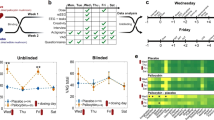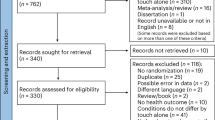Abstract
The nature and magnitude of placebo and nocebo responses to ADHD medications and the extent to which response to active medications and placebo are inter-correlated is unclear. To assess the magnitude of placebo and nocebo responses to ADHD and their association with active treatment response. We searched literature until June 26, 2019, for published/unpublished double-blind, randomised placebo-controlled trials (RCTs) of ADHD medication. Authors were contacted for additional data. We assessed placebo effects on efficacy and nocebo effects on tolerability using random effects meta-analysis. We assessed the association of study design and patient features with placebo/nocebo response. We analysed 128 RCTs (10,578 children/adolescents and 9175 adults) and found significant and heterogenous placebo effects for all efficacy outcomes, with no publication bias. The placebo effect was greatest for clinician compared with other raters. We found nocebo effects on tolerability outcomes. Efficacy outcomes from most raters showed significant positive correlations between the baseline to endpoint placebo effects and the baseline to endpoint drug effects. Placebo and nocebo effects did not differ among drugs. Baseline severity and type of rating scale influenced the findings. Shared non-specific factors influence response to both placebo and active medication. Although ADHD medications are superior to placebo, and placebo treatment in clinical practice is not feasible, clinicians should attempt to incorporate factors associated with placebo effects into clinical care. Future studies should explore how such effects influence response to medication treatment. Upon publication, data will be available in Mendeley Data: PROSPERO (CRD42019130292).
This is a preview of subscription content, access via your institution
Access options
Subscribe to this journal
Receive 12 print issues and online access
$259.00 per year
only $21.58 per issue
Buy this article
- Purchase on Springer Link
- Instant access to full article PDF
Prices may be subject to local taxes which are calculated during checkout


Similar content being viewed by others
Data availability
In the spirit of Open science, the full dataset will be available online (Mendeley Data) following the publication of this paper.
References
Cortese S, Adamo N, Del Giovane C, Mohr-Jensen C, Hayes AJ, Carucci S, et al. Comparative efficacy and tolerability of medications for attention-deficit hyperactivity disorder in children, adolescents, and adults: a systematic review and network meta-analysis. Lancet Psychiatry. 2018;5:727–38.
Leucht S, Hierl S, Kissling W, Dold M, Davis JM. Putting the efficacy of psychiatric and general medicine medication into perspective: review of meta-analyses. Br J Psychiatry. 2012;200:97–106.
Evers AWM, Colloca L, Blease C, Annoni M, Atlas LY, Benedetti F, et al. Implications of placebo and nocebo effects for clinical practice: expert consensus. Psychother Psychosom. 2018;87:204–10.
Finniss DG, Kaptchuk TJ, Miller F, Benedetti F. Biological, clinical, and ethical advances of placebo effects. Lancet. 2010;375:686–95.
Carvalho C, Caetano JM, Cunha L, Rebouta P, Kaptchuk TJ, Kirsch I. Open-label placebo treatment in chronic low back pain: a randomized controlled trial. Pain. 2016;157:2766–72.
Kaptchuk TJ. Open-label placebo: reflections on a research agenda. Perspect Biol Med. 2018;61:311–34.
Kaptchuk TJ, Miller FG. Open label placebo: can honestly prescribed placebos evoke meaningful therapeutic benefits? Bmj. 2018;363:k3889.
Buitelaar JK, Sobanski E, Stieglitz RD, Dejonckheere J, Waechter S, Schauble B. Predictors of placebo response in adults with attention-deficit/hyperactivity disorder: data from 2 randomized trials of osmotic-release oral system methylphenidate. J Clin Psychiatry. 2012;73:1097–102.
Waxmonsky JG, Waschbusch DA, Glatt SJ, Faraone SV. Prediction of placebo response in 2 clinical trials of lisdexamfetamine dimesylate for the treatment of ADHD. J Clin Psychiatry. 2011;72:1366–75.
Ben-Sheetrit J, Peskin M, Newcorn JH, Daniely Y, Shbiro L, Rotem A, et al. Characterizing the Placebo Response in Adults With ADHD. J Atten Disord. 2020;24:425–33.
Fageera W, Traicu A, Sengupta SM, Fortier ME, Choudhry Z, Labbe A, et al. Placebo response and its determinants in children with ADHD across multiple observers and settings: A randomized clinical trial. Int J Methods Psychiatr Res. 2018;27:e1572. https://doi.org/10.1002/mpr.1572.
Newcorn JH, Sutton VK, Zhang S, Wilens T, Kratochvil C, Emslie GJ, et al. Characteristics of placebo responders in pediatric clinical trials of attention-deficit/hyperactivity disorder. J Am Acad Child Adolesc Psychiatry. 2009;48:1165–72.
Khan A, Fahl Mar K, Brown WA. Does the increasing placebo response impact outcomes of adult and pediatric ADHD clinical trials? Data from the US Food and Drug Administration 2000–9. J Psychiatr Res. 2017;94:202–7.
DerSimonian R, Laird N. Meta-analysis in clinical trials. Control Clin Trials. 1986;7:177–88.
Egger M, Davey Smith G, Schneider M, Minder C. Bias in meta-analysis detected by a simple, graphical test. BMJ. 1997;315:629–34.
Duval S, Tweedie R. A nonparametric “trim and fill” method of accounting for publication bias in meta-analysis. J Am Stat Assoc. 2000;95:89–98.
Kahbazi M, Ghoreishi A, Rahiminejad F, Mohammadi MR, Kamalipour A, Akhondzadeh S. A randomized, double-blind and placebo-controlled trial of modafinil in children and adolescents with attention deficit and hyperactivity disorder. Psychiatry Res. 2009;168:234–7.
Cohen A, Plonsky-Toder M, Tirosh E. The short-term placebo response in children with Attention-Deficit Hyperactivity Disorder (ADHD). J Child Neurol. 2018;33:340–6.
Colloca L, Barsky AJ. Placebo and nocebo effects. N Engl J Med. 2020;382:554–61.
Storebø OJ, Gluud C. Methylphenidate for ADHD rejected from the WHO Essential Medicines List due to uncertainties in benefit-harm profile. BMJ Evid Based Med. 2020:bmjebm-2019-111328-. https://doi.org/10.1136/bmjebm-2019-111328.
Hoekstra PJ, Buitelaar JK. Response to: the evidence base of methylphenidate for children and adolescents with attention‑deficit/hyperactivity disorder is in fact flawed. Eur Child Adolesc Psychiatry. 2016;25:1039–40.
Charlesworth JEG, Petkovic G, Kelley JM, Hunter M, Onakpoya I, Roberts N, et al. Effects of placebos without deception compared with no treatment: a systematic review and meta-analysis. J Evid Based Med. 2017;10:97–107.
Kaptchuk TJ, Kelley JM, Conboy LA, Davis RB, Kerr CE, Jacobson EE, et al. Components of placebo effect: randomised controlled trial in patients with irritable bowel syndrome. BMJ. 2008;336:999–1003.
Kaptchuk TJ, Kelley JM, Deykin A, Wayne PM, Lasagna LC, Epstein IO, et al. Do “placebo responders” exist? Contemp Clin Trials. 2008;29:587–95.
Colloca L, Howick J. Placebos without deception: outcomes, mechanisms, and ethics. Int Rev Neurobiol. 2018;138:219–40.
Sandler AD, Bodfish JW. Open-label use of placebos in the treatment of ADHD: a pilot study. Child Care Health Dev. 2008;34:104–10.
Shinohara K, Tanaka S, Imai H, Noma H, Maruo K, Cipriani A, et al. Development and validation of a prediction model for the probability of responding to placebo in antidepressant trials: a pooled analysis of individual patient data. Evid Based Ment Health. 2019;22:10–16.
Acknowledgements
We thank the European ADHD Guidelines group (EAGG) for creating the publicly available data used in this manuscript. Dr. Faraone is supported by the European Union’s Horizon 2020 research and innovation programme under grant agreement No 667302 and 965381; NIMH grants U01MH109536-01, U01AR076092-01A1, R0MH116037 and 5R01AG06495502. Dr Cipriani is supported by the National Institute for Health Research (NIHR) Oxford Cognitive Health Clinical Research Facility, by an NIHR Research Professorship (grant RP-2017–08-ST2–006), by the NIHR Oxford and Thames Valley Applied Research Collaboration and by the NIHR Oxford Health Biomedical Research Centre (grant BRC-1215–20005). The views expressed are those of the authors and not necessarily those of the UK National Health Service, the NIHR, or the UK Department of Health.
Author information
Authors and Affiliations
Contributions
SVF, JHN, AC and SC designed the study protocol. SVF ran the analyses and wrote the first draft. All authors provided critical comments on multiple drafts of the manuscript. SC designed the search strategy and data extraction protocol and addressed data management issues. SH, AK and AH completed the literature search and extracted data under the supervision of SC.
Corresponding author
Ethics declarations
Conflict of interest
In the past year, SVF received income, potential income, travel expenses continuing education support and/or research support from Arbor, Genomind, Ironshore, KemPharm/Corium, Ondosis, Otsuka, Rhodes, Shire/Takeda, Supernus, and Tris. With his institution, he has US patent US20130217707 A1 for the use of sodium–hydrogen exchange inhibitors in the treatment of ADHD. He also receives royalties from books published by Guilford Press: Straight Talk about Your Child’s Mental Health, Oxford University Press: Schizophrenia: The Facts and Elsevier: ADHD: Non-Pharmacologic Interventions. He is Program Director of www.adhdinadults.com. In the past year, JHN is/has been an advisor and/or consultant for Adlon Therapeutics, Arbor, Cingulate Therapeutics, Corium, Eisai, Lundbeck, Medice, Myriad Neuroscience, NLS, OnDosis, Rhodes, Shire/Takeda, and Supernus. He has received research support from the National Institute on Drug Abuse (NIDA), the Eunice Kennedy Shriver National Institute of Child Health and Human Development (NICHD), Adlon, Shire and Supernus. He also has received speaker fees from Shire/Takeda for disease-state presentations, and served as a consultant for the US National Football League. AC has received research and consultancy fees from INCiPiT (Italian Network for Paediatric Trials), CARIPLO Foundation and Angelini Pharma. DB serves as an unpaid scientific consultant for an EU-funded neurofeedback trial. AK reports no financial disclosures. SH has no financial disclosures. AH received conference support, speaker’s fee and/or served in an advisory role for Shire/Takeda and Lily. He was involved as investigator in clinical trials by Shire, Janssen-Cilag, Otsuka, Sunovion, Servier, Lundbeck, Takeda, Nuvelution, Gedeon Richter, and Emalex. The present work is unrelated to the above relationships. SC declares reimbursement for travel and accommodation expenses from the Association for Child and Adolescent Central Health (ACAMH) in relation to lectures delivered for ACAMH, Canadian ADHD Resource Alliance (CADDRA), British Association of Psychopharmacology (BAP), and from Healthcare Convention for educational activity on ADHD.
Additional information
Publisher’s note Springer Nature remains neutral with regard to jurisdictional claims in published maps and institutional affiliations.
Supplementary information
Rights and permissions
About this article
Cite this article
Faraone, S.V., Newcorn, J.H., Cipriani, A. et al. Placebo and nocebo responses in randomised, controlled trials of medications for ADHD: a systematic review and meta-analysis. Mol Psychiatry 27, 212–219 (2022). https://doi.org/10.1038/s41380-021-01134-w
Received:
Revised:
Accepted:
Published:
Issue Date:
DOI: https://doi.org/10.1038/s41380-021-01134-w
This article is cited by
-
Improving Methylphenidate Titration in Children with Attention-Deficit/Hyperactivity Disorder (ADHD): A Randomized Controlled Trial Using Placebo-Controlled Titration Implemented in Clinical Practice
Pediatric Drugs (2024)
-
Methylphenidate dose–response in children with ADHD: evidence from a double-blind, randomized placebo-controlled titration trial
European Child & Adolescent Psychiatry (2024)
-
Predictors of placebo response in three large clinical trials of the V1a receptor antagonist balovaptan in autism spectrum disorder
Neuropsychopharmacology (2023)
-
Short-term effects of an elimination diet and healthy diet in children with attention-deficit/hyperactivity disorder: a randomized-controlled trial
European Child & Adolescent Psychiatry (2023)
-
Viloxazine for attention-deficit hyperactivity disorder: a new formulation for a new indication
Drugs & Therapy Perspectives (2022)



